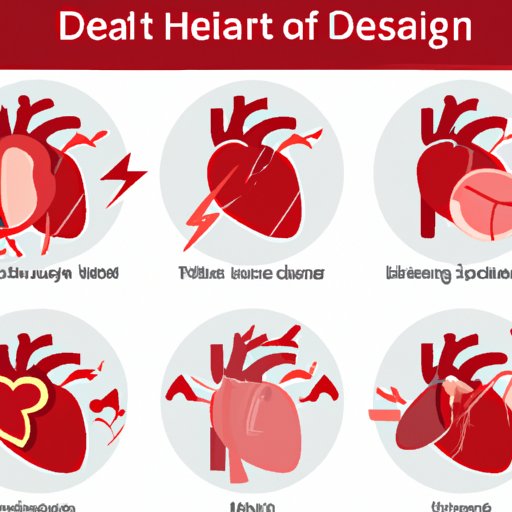
Introduction
Heart disease is a leading cause of death worldwide, which is why it is crucial to pay attention to the signs and symptoms that may indicate a problem with your heart health. By knowing the warning signs and taking early action, you can protect yourself and reduce the risk of complications.
10 Warning Signs of Heart Disease You Need to Know
Here are the ten key warning signs that can help identify heart disease:
1. Chest Pain or Discomfort
This is one of the most common signs of heart disease. It can feel like pressure, tightness, or a squeezing sensation in your chest. The pain may also spread to your shoulders, arms, neck, jaw, or back.
2. Shortness of Breath
Difficulty breathing can also be a sign of heart disease. You may feel as though you are unable to catch your breath, or you may experience wheezing, coughing, or chest congestion.
3. Fatigue
Feeling tired or lacking energy can be a sign of heart disease, even if you have not exerted yourself. You may feel drained or sleepy and find it difficult to stay awake during the day.
4. Dizziness or lightheadedness
If you have heart disease, you may feel dizzy or lightheaded, especially when standing up too quickly. You may also experience fainting or a feeling of weakness.
5. Irregular heartbeat
A heart that beats too quickly, too slowly, or in an irregular pattern can be an indication of heart disease. You may notice a fluttering sensation in your chest, or your heart may feel like it’s skipping a beat.
6. Swelling in the legs, ankles, or feet
Heart disease can cause fluid to build up in your body, leading to swelling in your legs, ankles, or feet. You may also experience weight gain or bloating.
7. Nausea, indigestion, or stomach pain
Although less common, heart disease can cause digestive symptoms such as nausea, indigestion, or abdominal pain. You may feel like you have heartburn or acid reflux.
8. Cold sweats
Breaking out in a cold sweat, especially if it is accompanied by other symptoms such as chest pain or shortness of breath, can be a sign of heart disease.
9. Persistent cough
A cough that won’t go away, or that produces pink or white mucus, can be a sign of a Heart failure. It can also be a sign of fluid accumulation in the lungs, which can make it difficult to breathe.
10. High blood pressure or cholesterol
Although these are not direct symptoms of heart disease, they are risk factors that can increase the likelihood of developing heart disease. High blood pressure and cholesterol can lead to the buildup of plaque in your arteries, which can increase the risk of heart attack or stroke.
Is Your Heart Trying to Tell You Something? Identifying the Common Symptoms of Heart Disease
While the above symptoms are direct signs of heart disease, there are other symptoms that, although not always obvious, can indicate a problem with your heart health.
11. Pain in the Jaw, Neck, or Shoulders
You may mistake the pain as an ache in your jaw because the nerves contributing to the heart also run down the neck and arms. The pain in the shoulders is often so sudden that you may think it’s because of a shoulder issue.
12. Sweating
Sweating can happen as the body tries to cool down when feeling not good. It can also be the sign of a heart attack, which is why it is important to pay attention to other symptoms you may experience along with sweating.
13. Tiredness or fatigue from daily activities
Being overfatigued may be a sign of many conditions and can have multiple causes, but with the presence of other symptoms such as shortness of breath, swollen ankles, or chest pain, it is best to get checked as it could be an indication of heart disease.
Don’t Ignore These Warning Signs of Heart Disease
It’s crucial to pay attention to the warning signs and not ignore them, or you may risk your life by not taking the necessary steps to protect your heart.
As an example, in some cases, ignoring the warning signs of heart disease can lead to a heart attack or stroke, which can cause serious complications or even death.
Recognizing Early Signs of Heart Disease: A Guide for a Healthy Heart
Prevention is always better than cure. If you can identify the early signs of heart disease, you can take actionable steps to prevent it from worsening and effectively protect yourself from heart diseases.
Some early signs of heart disease include chest pain, shortness of breath, difficulty sleeping, feeling tired for no apparent reason, and unexplained weight gain. High blood pressure and cholesterol also increase your risk of heart disease, so keeping their numbers below the standard is crucial.
What You Need to Know About the Symptoms of Heart Disease
It is important to keep in mind that while there are common symptoms of heart disease, each person’s experience can vary. In fact, some individuals experience no symptoms at all.
By understanding the symptoms and paying attention to your body, you can become aware of potential problems with your heart and take steps to prevent complications.
Conclusion
Heart disease is a silent killer, and we need to be aware of the warning signs that it may be trying to tell us. By being knowledgeable of the early warning signs and knowing what to keep an eye out for, you can take a proactive approach to protect your health and potentially save your life. Pay attention to your body and don’t hesitate to seek professional medical help if you experience any of the signs discussed in this article. The more awareness we bring to the topic of heart disease, the better we can protect ourselves and our loved ones.





